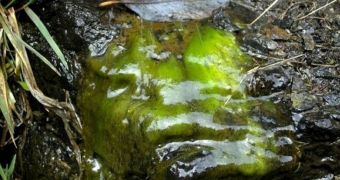Several studies have until now argued that climate change and global warming will really mess up our planet. The thing is that, of these studies, the majority deliver bits and pieces of information intended to scare us into limiting environmental pollution and greenhouse gas emissions.
Leave it to Brad Taylor with the Dartmouth College in Hanover, US, and his colleagues to take an entirely different approach and gross people out rather than scare them into being eco-friendly.
In a recent paper, these researchers explain that, as global warming progresses, something known as “rock snot” has high chances to become a common sight in waterways across the world, Live Science informs.
For those unaware, this so-called rock snot, a picture of which is available above, it a type of freshwater algae whose presence has until now been documented in rivers in New Zealand, Europe, Canada, and the United States.
Studies have shown that this species of freshwater algae is native to many of the world's waterways, and that the only reason why humanity has not totally freaked out about it until now is because environmental conditions have kept its development in check.
The trouble is that, according to evidence at hand, rock snot, whose official name is Didymosphenia geminate or didymo, loves and adores the changes in environmental conditions brought about by climate change and global warming, and various human activities.
Specifically, studies have shown that this freshwater algae thrives in waterways whose phosphorus levels have decreased either as a result of pollution or because of changes in the makeup of natural ecosystems for which global warming and other human-related phenomena are to blame.
Specialist Brad Taylor with the Dartmouth College and his colleagues say that, under a business-as-usual scenario, it is probably only a matter of time until snot blooms are documented in several waterways across the world on a regular basis.
Given the fact that algae blooms have been shown to be a threat to natural ecosystems and even fishing practices, the researchers recommend that efforts be made to better regulate environmental pollution and limit climate change and global warming.
More so seeing how, according to investigations, didymo is not one to leave a waterway it has set up camp in all that easily. “The weight of evidence suggests didymo is native to nearly all areas where blooms are occurring. Nothing can be done to eradicate this microorganism. It has been here, and is here to stay,” Brad Taylor says.

 14 DAY TRIAL //
14 DAY TRIAL //